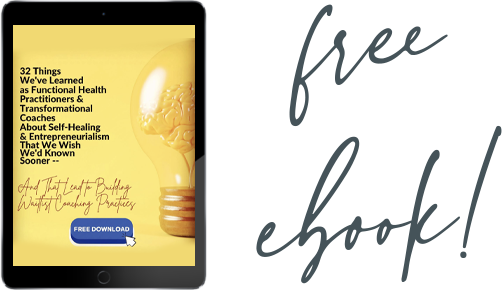11 March, 2021
10 Key Steps to Nourish Your Body’s Circadian Rhythm

Do you struggle with…?
- Low energy
- Trouble sleeping throughout the night
- Slow metabolism
- Hormonal imbalances
If yes, your circadian rhythm could likely use a little attention.
In fact, I’d say this is something we ALL ought to take a closer look at, no matter our health and wellness goals.
Because the body’s circadian rhythm doesn’t just dictate when we’re sleeping and awake — it dictates our body’s ability to have the deep, restorative rest it requires to heal and thrive. This has a trickle down effect on just about every aspect of our health and wellness, from hormones and metabolism to mental health.
Unfortunately, so many of us struggle with a broken circadian rhythm!
So in this blog post, we’re breaking it all down:
- What is the body’s circadian rhythm?
- The consequences of a broken circadian rhythm
- How to start nourishing your body’s circadian rhythm to reach your health and wellness goals

What is the body’s circadian rhythm?
The body’s circadian rhythm or circadian clock is a natural, internal process that regulates our sleep-wake cycle. It repeats about every 24 hours, on each rotation of the Earth.
But the circadian rhythm does so much more than just dictate when we’re asleep versus awake. Brain wave activity, metabolism, hormone production, cell regeneration and nearly all other essential biological activities are linked to this daily cycle.
So a healthy, smooth-operating circadian rhythm is essential for a healthy, thriving body.
Unfortunately, SO many of us struggle with a broken circadian rhythm — usually without even realizing it! Needless to say, this can take a major toll on our health and wellness.
The consequences of a broken circadian rhythm
When the circadian rhythm is disrupted, the body doesn’t get the deep, restorative rest it requires to heal and thrive. More importantly, the other biological activities that are influenced by the circadian rhythm are disrupted as well.
Here’s what exactly this can mean for the body…
- Cells lose power and become vulnerable to damage
- Metabolism slows
- Genes for poor health and illness are turned on and genes for healing are turned off
- The nervous system gets stuck in “fight or flight” mode
- Hormone balance and production is disrupted
- Disrupted neurotransmitter balance, which has a tremendous impact on mood and mental health
- Impaired anti-inflammatory response
- Impaired digestion and detoxification
- Increased blood sugar and insulin levels
Do you see how the circadian rhythm is so much more than when we fall asleep and wake up again!?
10 key steps to nourish your body’s circadian rhythm
Now you’re likely wondering how to start nourishing your body’s circadian rhythm to help reach your health and wellness goals.
As you’ll see, there are so many different factors that influence the body’s circadian rhythm — nutrition, movement, our physical surroundings — and each of the following steps uses these as tools to restore balance and the natural cycle.
GREET THE SUN IN THE MORNING
Try to get at least thirty minutes of natural sunlight exposure within thirty minutes of waking up. As simple as it may sound, this is the best way to alert the body that it’s time to wake up and take on the day.
Of course, this may not be practical for everyone! So if you live in a climate that is not conducive to sunlight exposure in the morning, consider a full spectrum 10,000 lux lightbox.
KEEP CAFFEINE TO THE AM
Caffeine should be relegated to the morning only, and only consumed in moderate amounts.
If you struggle with severe fatigue and chronic health issues, consider taking a complete break from caffeine for at least three months. I know this may seem impossible at first! But your body will thank you in dividends, and by restoring your natural circadian rhythm, you’ll find you have even more energy than you did when you were reliant on caffeine. Take this as a challenge to see for yourself!
Related Post: Homemade Herbal Coffee
KEEP BLOOD SUGAR LEVELS BALANCED THROUGHOUT THE DAY
Blood sugar spikes and crashes rob us of energy throughout the day and prevent deep sleep at night.
So be sure to balance nutrient-dense, whole-food sources of carbohydrates with healthy amounts of protein and fats with each meal and each snack. Just as important: don’t skip out on breakfast or any other meal, as this can throw blood sugar levels into havoc.
Related Post: How Blood Sugar Impacts Hormones + How to Start Restoring Balance
SUPPORT YOUR BODY’S MINERAL STATUS
Most people are severely deficient in minerals, especially magnesium. This contributes to stress, which prevents proper sleep. But we don’t want to just focus on one mineral and there are many that need to be in balance for our health to improve. We love using Hair Tissue Mineral Analysis Tests as a tool with all of our clients to best assess this area.
GET MOVING… BUT NOT TOO LATE IN THE DAY
Make exercise a regular part of your daily routine, preferably in the morning or earlier in the day.
If you struggle with severe fatigue,get started with a slow walk around the block and relaxing stretching.
Avoid rigorous workouts or any sort of strenuous activity within the four hours before bedtime. Again, the majority of your daily activity should be during daylight hours, and rest reserved for the evening.
ACTIVELY REDUCE STRESS THROUGHOUT THE DAY AND BEFORE BED
Deep, restorative sleep is impossible when the body’s stress response is constantly engaged.
Going for a leisurely walk outside, practicing gratitude, and meditating are all great ways to actively reduce stress each day.
Grab Our FREE Guide: 15 Ways to Support Your Adrenals
GO SCREEN-FREE BEFORE BEDTIME
Blue light exposure after sunset impairs melatonin production, a key hormone for regulating sleep.
So make a point to be off all electronics and screens at least one hour before bed… though the longer, the better!
Yes, this also means it’s a good idea to kick the TV out of the bedroom.
If blue light exposure is unavoidable after sunset, invest in a pair of blue light blocking glasses. They filter this melatonin-suppressing light.
TIME DINNER WITH BEDTIME
Eat your last meal of the day at least three hours before bed.
Eating too late in the evening means your body will need to focus its energy on digestion rather than cellular repair and regeneration. Snacking in the middle of the night is especially disruptive to this process!
STICK TO A CONSISTENT BEDTIME ROUTINE
Create a relaxing wind-down ritual that you do before bed. One of my favorites is keeping a gratitude journal. You may also plan for the next day, helping to move any stressful or worrying thoughts from your mind to paper.
A hot shower 60-90 minutes before bed will also help your body to cool down. This helps increase melatonin production and signals the body that it’s time to sleep.
SET THE STAGE a.k.a. BEDROOM FOR A GREAT NIGHT’S SLEEP
Keep the temperature of your bedroom cool, ideally between 60-65 degrees fahrenheit.
It’s also important to block ALL sources of light as even low light can block the production of the sleep hormone, melatonin, and give the body a false signal that it’s time to be awake. If need be, invest in blackout curtains or a sleep eye mask.
When you’re ready for bed, make sure your cell phone is in airplane mode, turn off bluetooth, and place it in another room or as far away from your body as possible as EMFs are suspected to interfere with sleep.
Let’s keep the conversation going! Let us know in the comments below…
Does your circadian rhythm need some extra TLC?
Which tips will you start making part of your routine?
Any questions?
Looking forward to talking more soon and supporting you on your health journey!









